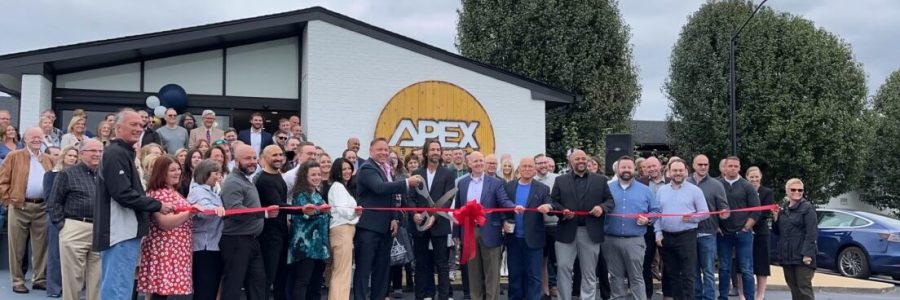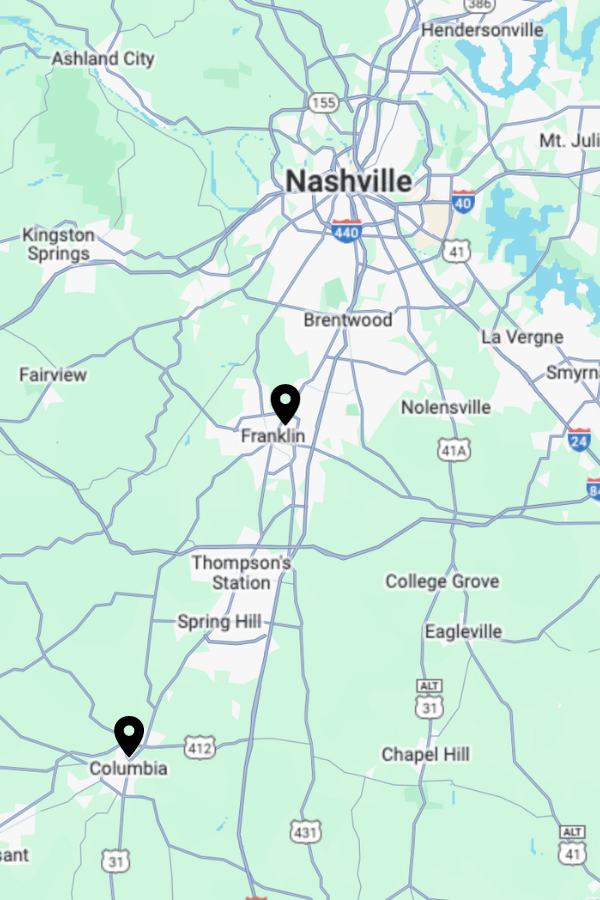Find your journey of recovery at 30-day inpatient drug and alcohol addiction rehab centers in Tennessee. Let’s look at the 30-day rehab programs these facilities offer and learn about the supportive environment, approaches, and amenities they provide. Discover how Apex Addiction Recovery Center in Tennessee can be the cornerstone of a new beginning.

What is a 30-Day Inpatient Rehab Program in TN?
A 30-day inpatient rehab program in Tennessee is a structured, intensive treatment option designed for people battling drug and alcohol addiction in the Volunteer State. Set within a supportive and controlled environment, these programs focus on detoxification, therapy, and skill-building to manage addiction, for long-term recovery. Patients reside at the 30-day rehab facility throughout the duration for maximum support.
These programs typically combine individual counseling, group therapy, and educational workshops to target the physical, emotional, and psychological aspects of addiction. By immersing patients in a healing environment away from everyday stressors and triggers, 30-day inpatient rehabs in Tennessee offer a critical step towards reclaiming life from addiction, emphasizing relapse prevention and personal growth.
Free Addiction Assessment
Schedule a free, confidential assessment with a licensed clinician. Apex Recovery can check your insurance coverage levels for drug and alcohol addiction, and mental health treatment.
How Much Does 30-Day Drug and Alcohol Rehab Cost in Tennessee?
The cost of a 30-day drug and alcohol rehab program in Tennessee can vary widely, typically ranging from $6,000 to $20,000, depending on the facility’s amenities, location, and the types of treatment offered. Luxury rehabs with more personalized care and upscale amenities can exceed $30,000 for the same duration.
Factors influencing the price of 30-day treatment centers for addiction near me include the staff-to-patient ratio, the level of clinical care, and additional services such as holistic therapies or specialized treatment tracks. Insurance coverage can significantly reduce out-of-pocket expenses, making it important for people to verify their benefits with rehab centers like Apex Alcohol and Drug Addiction Recovery Center. Some facilities also offer sliding scale fees or payment plans to help make treatment more accessible.

- Please complete and send the form below.
- One of our staff members will contact your insurer to check your coverage.
- We will contact you promptly with the results and to discuss the next steps.
Insurance Verification
"*" indicates required fields
30-Day Inpatient Rehab Treatment Programs in Tennessee (TN)
Apex Recovery Center in Tennessee offers a range of comprehensive programs, including Substance Abuse Partial Hospitalization (PHP), Intensive Outpatient Program (IOP), Medication-Assisted Treatment (MAT), and General Outpatient services. Looking for an inpatient drug rehab near me? We are currently accepting new patients and ready to assist individuals in beginning their journey towards recovery. Call us or contact us online today.
How to Find 30-Day Inpatient Rehab Centers Near Me in TN?
To embark on your recovery journey with Apex Recovery Center’s different programs, including Substance Abuse Partial Hospitalization (PHP), Intensive Outpatient Program (IOP), Medication-Assisted Treatment (MAT), and General Outpatient services, follow these steps to find the right 30-day drug treatment programs in Tennessee:
- Conduct Online Research: Utilize search engines and addiction treatment directories with keywords like “30 day inpatient rehab near me,” “30-day addiction treatment facilities in Tennessee,” or “30 day rehab inpatient near me” to discover appropriate facilities.
- Utilize Treatment Referral Helplines: Reach out to referral helplines, hotlines, or support organizations for a curated list of reputable rehab centers and guidance on selecting the appropriate program for your needs.
- Consult Healthcare Professionals: Engage with therapists, counselors, or physicians specializing in addiction treatment for professional recommendations and insights on local rehab options.
- Seek Personal Recommendations: Leverage the experiences of friends, family, or acquaintances who’ve undergone addiction treatment for firsthand insights into various nearby rehab centers.
- Read Reviews and Testimonials: Investigate online feedback from past clients to evaluate the care quality and treatment effectiveness at different centers, focusing on aspects like program content, staff expertise, and patient satisfaction.
- Verify Licensing and Accreditation: Ensure the close by rehab centers you’re considering hold the necessary licensing and accreditation, affirming their adherence to quality and ethical standards.
- Assess Location and Accessibility: Consider the one-month rehab center’s location for its convenience and whether its proximity to your support network or the benefit of a new environment is a priority for you.
- Examine Treatment Approaches: Investigate each center’s treatment methodologies and services, ensuring they meet your specific recovery needs, including the availability of therapies, detox services, and aftercare support.
- Reach Out to Centers: Contact rehab centers in the vicinity to ask about their short-duration recovery programs, philosophy, staff qualifications, and any specific requirements you have. Discuss customization of treatment plans.
- Inquire About Insurance and Costs: Confirm with the centers about insurance compatibility or available financing options, understanding all program costs to ensure they fit within your budget.
- Visit Facilities: If possible, visit the facilities to personally assess the environment, meet the staff, and ask detailed questions, giving you a clearer picture of where you might start your recovery.
- Make Your Decision: With all information at hand, compare the rehab centers based on how well they match your month-long recovery needs and preferences. Go with the center that best aligns with your path to recovery.
Following these steps can help you find the right 30-day alcohol rehab center in Tennessee, including Apex Recovery Center to support your journey to recovery.
Apex Recovery Franklin
4601 Carothers Pkwy STE 250A
Franklin, TN 37067
Apex Recovery Columbia
2710 Trotwood Ave STE A & B
Columbia, TN 38401
Free Addiction Assessment
Schedule a free, confidential assessment with a licensed clinician. Apex Recovery can check your insurance coverage levels for drug and alcohol addiction, and mental health treatment.

What is a 30-Day Inpatient Rehab Intake Process in TN?
The intake process for a 30-day inpatient rehab program in Tennessee often begins with an initial assessment to evaluate the individual’s physical health, mental well-being, and substance use history. This assessment helps the team understand unique needs and develop a customized treatment plan. Upon admission, patients may undergo medical screenings and assessments to ensure their safety during detoxification if necessary.
Additionally, people are often required to provide personal information, medical history, insurance details, and any relevant legal documents. This information assists the facility in creating an individualized treatment approach and addressing any specific concerns or preferences the patient may have. Throughout the intake process, confidentiality and privacy are prioritized to foster trust and encourage open communication between the patient and the treatment team.
Free Addiction Assessment
Schedule a free, confidential assessment with a licensed clinician. Apex Recovery can check your insurance coverage levels for drug and alcohol addiction, and mental health treatment.
What is a 30-Day Rehab Treatment Program Process and Schedule in TN?
A 30-day rehab treatment program in Tennessee is structured to provide a comprehensive, immersive healing experience for people struggling with substance use disorders. The process is meticulously designed to guide patients through various stages of recovery, starting from detoxification to therapy, education, and aftercare planning. Here’s how the process, schedule and therapies work.
The Treatment Process:
- Detoxification: managed under medical supervision to ensure the patient’s safety as their body clears itself of substances. The duration of this phase varies depending on the substance and severity of dependence.
- Assessment: conducted to tailor the treatment plan to the patient’s needs. This includes evaluating psychological, social, and behavioral aspects of addiction.
- Therapy and Counseling: various therapeutic interventions to address the root causes of addiction and equip patients with coping strategies.
- Education: learn about addiction and its impact on the brain and body, giving a deeper understanding of their recovery process.
- Aftercare Planning: staff help patients plan for continued care after leaving the facility, which may include outpatient therapy, support groups, or sober living arrangements.
Sample Schedule:
- Morning: Wake up, followed by a nutritious breakfast and a morning meditation or mindfulness session to start the day focused and centered.
- Late Morning: Group therapy session, which could include Cognitive Behavioral Therapy (CBT) to identify and challenge negative thought patterns, or Dialectical Behavior Therapy (DBT) to improve emotional regulation and distress tolerance skills.
- Afternoon: After lunch, patients might participate in specialized therapy sessions, such as Motivational Interviewing (MI) to enhance motivation towards recovery, or family therapy to repair and repair relationships affected by addiction.
- Evening: Following dinner, there could be a 12-step or similar support group meeting. The day usually concludes with some free time for personal reflection or leisure before bedtime.
Therapy Methods Explained:
- Cognitive Behavioral Therapy (CBT): Focuses on identifying negative thought patterns that contribute to addiction, aiming to transform these into positive, healthy thoughts and behaviors.
- Dialectical Behavior Therapy (DBT): Emphasizes the development of coping mechanisms to manage stress, regulate emotions, and improve relationships.
- Motivational Interviewing (MI): A patient-centered approach that addresses ambivalence to change, helping people find the internal motivation to pursue recovery.
- Family Therapy: Involves family members in the treatment process to improve communication, resolve conflicts, and create a supportive home environment post-rehab.

What Happens After the 30-Day Treatment Program is Complete in Tennessee?
Upon completing a 30-day treatment program in Tennessee, an evaluation is conducted to assess the patient’s progress and readiness for transition. This evaluation helps in formulating a personalized aftercare plan aimed at sustaining recovery and preventing relapse. Support groups play a crucial role in aftercare. Patients are often encouraged to join groups like Alcoholics Anonymous (AA) or Narcotics Anonymous (NA).
Aftercare options may include outpatient therapy or sober living homes, which allows people to continue their therapy sessions while integrating back into their daily lives. The combination of these therapies, along with a structured daily routine, creates a supportive environment for people to address their addiction and lay the groundwork for a life in recovery.

Some Statistics and Information About 30-Day Rehab in Tennessee
- In a single-day count in 2014, 14,079 people in TN were enrolled in substance use treatment
- In a single-day count in 2019, 28,899 people in TN were enrolled in substance abuse treatment
- Approximately 10% of those being treated in TN were for alcohol only
- Almost 62% of those being treated in TN were for drugs only
- 28% of those being treated in TN were for both drugs and alcohol
- 10,080 people were treated in Tennessee for opioids
- 6,966 people were treated in Tennessee for alcohol
- 7,328 people were treated in Tennessee for marijuana
- 9.6% of all rehab admissions in the U.S. are short-term rehab inpatient treatments
- The average stay for these patients is 26 days
Sources:

